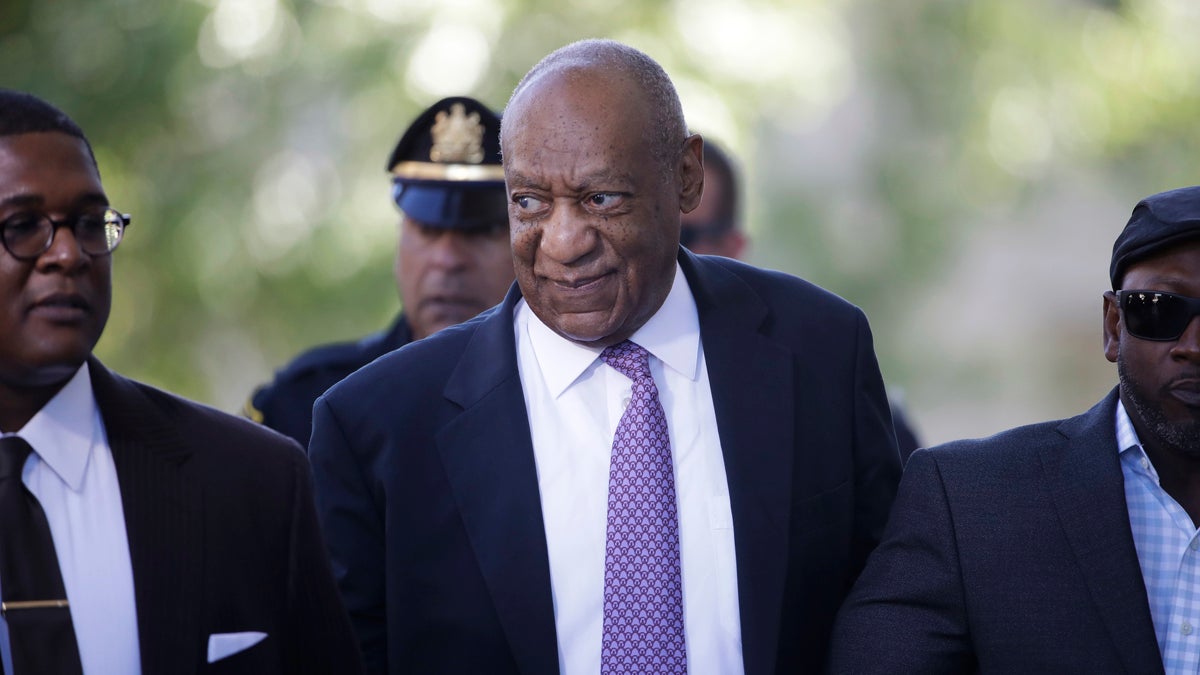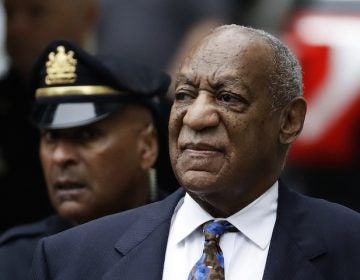Cosby Trial: Day 5
Listen
Bill Cosby arrives for his sexual assault trial at the Montgomery County Courthouse in Norristown, Pa., Friday, June 9, 2017. (Matt Rourke/AP Photo)
Bill Cosby apologized to the mother of the woman he’s accused of drugging and raping because he worried she thought he was a “dirty old man,” according to testimony read to jurors on the fifth day of the entertainer’s sexual assault trial in Norristown.
That explanation emerged from a decade-old deposition Cosby gave in accuser Andrea Constand’s 2005 civil lawsuit against him. Montgomery County Judge Stephen O’Neill has twice rejected defense efforts to suppress parts of that deposition, in which the man known as “America’s Dad” admitted he used Quaaludes to seduce women.
Prosecutors wrapped up their case against Cosby, 79, Friday, with the defense team set to begin presenting their case on Monday.
Cosby’s defense team now is considering putting him on the witness stand, even though he has said he wouldn’t testify at his trial.
“Nothing is ever off the table when you have a trial of this magnitude,” his spokesman Andrew Wyatt told reporters during a lunch break Friday. “So we’re weighing every option. In a ball game, things change, and players are taken out. And sometimes a star player plays, and sometimes they don’t.”
Listen to the latest episode of WHYY’s podcast, ‘Cosby Unraveled.’
Constand has accused Cosby of drugging and groping her after dinner at his Cheltenham Township mansion in early 2004. She reported the incident to police a year later. Montgomery County prosecutors at the time decided not to file charges, but different prosecutors did charge him in December 2015.
So far this week, jurors have heard the first-hand accounts of two women – Constand and accuser Kelly Johnson – who say Cosby sexually assaulted them while they were in a haze of drug-induced confusion. Prosecutors set out to explain Friday afternoon how their subsequent decision not to immediately report the alleged assaults was not unusual.
Constand waited a year to report her encounter to authorities. Johnson, who worked for Cosby’s agent at the time, also didn’t immediately report her 1996 encounter with the comedian, in which she said she woke up half-naked in his bed after he gave her a pill that knocked her out.
Prosecutors called psychologist Veronique N. Valliere, an Allentown-based expert on sexual abuse victims and author of “Understanding the Non-Stranger Rapist,” to the witness stand to explain such delays.
“We have a misunderstanding of what sexual assault is,” Valliere told jurors. “Most people think it’s violent and done by a stranger, and it’s reported right away. Sexual assault isn’t [always] like that.”
Victims of sexual assault, she said, often do not resist. In many case, they will verbally rebuff an offender, but shock and confusion can keep them from escaping or physically resisting, she testified.
Drugs and alcohol further complicate a victim’s reaction to what happened, she said.
“When there is an intoxicant used, self-blame goes up,” she said. “They have to make a decision that that person could have done it.”
Victims also typically want to resume their normal lives and dread reliving the assault through a police investigation or prosecution, she said.
All those factors can silence a victim or delay any decision to report the attack, Valliere said.
While the judge forbade Valliere from commenting about Constand or Johnson, prosecutors hope the insinuation is clear: Valliere’s expert knowledge is the window through which jurors should understand why Cosby’s alleged victims took so long to come forward.
After the jury left for lunch, defense attorney Brian McMonagle called for a mistrial, complaining that Valliere’s testimony would prejudice the jury. O’Neill denied that request, citing a Pennsylvania statute allowing such expert testimony as a way of buttressing evidence in sexual assault cases.
After lunch, McMonagle raged that Valliere wasn’t impartial and had shared on Facebook an article about the judge allowing the case against Cosby to proceed – news she called “a victory.”
While Valliere was the only expert on sexual assault victims to testify, plenty of others attended the trial, including Kristen Houser, a spokeswoman for the National Sexual Violence Resource Center.
She described what she’s heard as “nothing unusual.”
“It’s very normal that people [victims] wait to disclose, it’s very normal that they maintain a friendship that was preexisting to the assault, it’s normal that they’re considering all the other factors in their life – their employment, their relationships, their social circle – it’s normal to be very confused when you don’t have full memory of what happened during the assault,” Houser said. “There’s nothing from the victims’ testimony that was shocking to me, and I’ve been working in the field of sexual assault now for more than 25 years.”
Earlier Friday, key excerpts of the 1,000-page deposition were relayed to the jury, a dramatic reading of sorts where District Attorney Kevin R. Steele read the deposition questions and Montgomery County Det. James Reape, from the witness stand, recited Cosby’s responses.
The deposition’s details were made public two years ago, but this is the first time Cosby’s comments have been heard in criminal court – and by the jury of seven men and five women who will decide his fate.
It highlighted interactions Cosby had with Andrea’s mother, Gianna Constand, who twice talked to Cosby on the phone in an attempt to figure out what drugs he allegedly gave her daughter.
The first call was longer, and Cosby spoke bluntly about the encounter in question. Gianna Constand secretly recorded the second call, which was far less revealing.
Cosby has maintained the pills he gave Constand to alleviate her stress were the allergy drug Benadryl.
Cosby said he refused Gianna Constand’s request for proof of what the pills were, because he felt under attack by her.
“I’m at first thinking, the mother is coming at me for being a dirty old man, which is bad,” he said during his civil deposition.
Cosby agreed that there would be a “public consequence” if he had given Constand something other than Benadryl. While prosecutors haven’t presented evidence showing the pills were something stronger than Benadryl, that implication lengthened the window to prosecute, leading to criminal charges.
Dr. Timothy Rohrig, a forensic toxicologist from Kansas, testified that Benadryl is consistent with the symptoms that Constand described: dry mouth, difficulty moving, and sleepiness.
“You can sometimes appear, if you will, well, drunk,” he said.
Benadryl has been used to incapacitate women in previous criminal sexual assaults in London and the U.S., Rohrig added.
On cross-examination, McMonagle asked Rohrig, hypothetically, if McMonagle’s wife took one and a half Benadryl tabs with a sip of wine, they could have an “intimate” moment on their couch.
“I would hope so,” replied Rohrig, eliciting chuckles from the jury.
Earlier, McMonagle continued the defense’s efforts to show that Constand’s and Cosby’s relationship was consensual.
Asked why he offered to bankroll his accuser’s graduate school tuition, Cosby admitted in the 2005 deposition that he acted out of his fear that the Constands would try to embarrass or extort him. Writing a check to cover someone’s college costs also would prevent from his wife learning of the encounter, he added. The entertainer was known for supporting higher education.
During a court break Friday, Wyatt – a publicist who works in crisis management – told reporters gathered outside the courthouse: “They were in a relationship. They were having a relationship that he didn’t want his wife to know about. Finally, people [are] getting to hear the truth, and that was the purpose of this whole matter, for people to come hear the truth, not the sensationalism that you see in the news.”
Cosby’s wife Camille does support him, Wyatt added, even though she hasn’t attended the trial.
“You will eventually see some people [family]; it is all about timing,” Wyatt said, adding that the couple’s daughters also have come out publicly to support their father. “Mr. Cosby has always said he did not want his wife attacked by this media circus.”
As Cosby made his way into the courthouse just before 9 a.m. Friday, a handful of fans greeted him with shouts of “Hey, hey, hey!”
“Hey,” he responded, without breaking stride or responding to reporters’ questions.
Comedian Joe Torry accompanied Cosby into court on Thursday and Friday. He was among several celebrities, including actresses Keshia Knight-Pulliam and Sheila King, comedian Lewis Dix Jr., and civil rights activist Mary Frances Berry, who have come to support him.
Listen to the latest episode of WHYY’s podcast, ‘Cosby Unraveled.’
The trial has drawn hordes of journalists from as far away as Europe, as well as a few fans who holler support to Cosby as he comes in and out of the courthouse each day. Thursday, it also drew a protester from North Philly, who blasted Helen Reddy’s female empowerment anthem “I Am Woman” and ran after Cosby as he left the courthouse for the day.
“I hope this song haunts you in your sleep!” artist and activist Bird Milliken shouted at Cosby as he climbed into his black SUV at the end of the day. “We’re stronger than you, Bill! Hey, hey, hey, Bill! Shame on you!”
Constand spent seven hours testifying Tuesday and Wednesday that her relationship with Cosby started out as a professional one that evolved into friendship — and eventually, sexual advances from Cosby. She said she rebuffed such advances and made it clear they were unwelcome. Cosby, in turn, has maintained the sexual activity was consensual. Her civil lawsuit against him ended in a confidential settlement in 2006.
Since the trial started Monday, jurors have heard from Constand, Kelly Johnson, both of their mothers, several police officers, detectives, and friends, and Valliere.
Cosby could spend the rest of his life in prison, if convicted.
WHYY is your source for fact-based, in-depth journalism and information. As a nonprofit organization, we rely on financial support from readers like you. Please give today.




